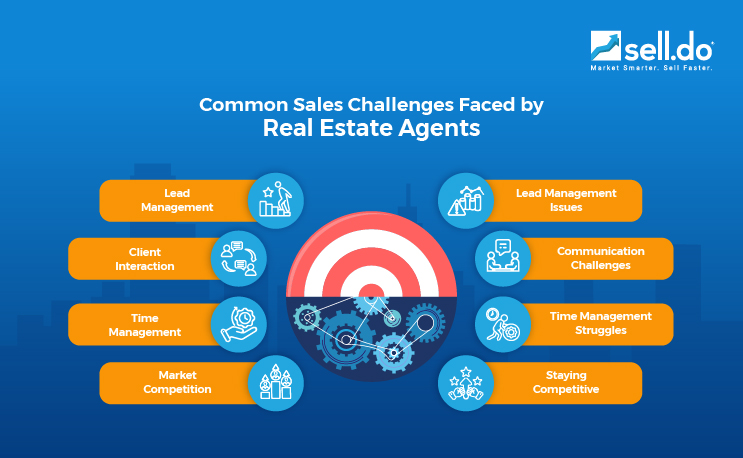The real estate industry is fast-paced and highly dynamic, requiring agents to juggle multiple tasks simultaneously. Effective customer relationship management (CRM) is essential for staying ahead of the curve. This blog delves into how CRM can streamline the sales process for real estate agents, addressing common challenges and providing valuable insights.
CRM systems have reformed how businesses manage their interactions with clients, especially in the real estate industry. Real estate CRM software is a game-changer, enhancing efficiency, improving client relationships, and ultimately driving sales. This blog explores the role of CRM in the real estate sector, the challenges agents face, and how CRM addresses these issues.
CRM Role in Streamlining the Sales Process
CRM is a technology used to facilitate a company's relationships and interactions with prospective and existing clients. Its primary role is to streamline processes, enhance customer service, and increase profitability. In real estate, CRMs can significantly improve the sales processes by automating tasks, organizing client information, and providing insights into client behaviour and market trends.
The Importance of CRM in Real Estate
In the competitive world of real estate, staying organized and maintaining excellent client relationships are paramount. A CRM system allows agents to centralize all their client data, track interactions, and manage leads efficiently. By doing so, agents can provide a more personalized service, which can lead to higher client satisfaction and increased sales.
Common Sales Challenges Faced by Real Estate Agents
By now, we have understood the importance of sales in the real estate business. However, real estate agents encounter several challenges regularly. These are:

-
Lead Management:
Tracking and managing a large volume of leads can be overwhelming. Without a systematic approach, potential clients may fall through the cracks.
-
Client Interaction:
Ensuring timely and personalized communication with clients is crucial but can be challenging, especially with a large client base.
-
Time Management:
Balancing multiple tasks and appointments efficiently requires robust organizational skills.
-
Market Competition:
Staying a step ahead in a competitive market requires staying informed about market trends and competitor activities.
-
Lead Management Issues:
Effective lead management in real estate sales is essential. A CRM system organizes and prioritizes leads, ensuring timely follow-ups and nurturing potential clients through the sales funnel.
-
Communication Challenges:
Effective communication in the real estate sales process is crucial. A CRM system centralizes interactions, sets reminders, and automates follow-ups, ensuring timely responses and personalized service, thus enhancing communication and client relationships.
-
Time Management Struggles:
Real estate agents juggle with multiple tasks simultaneously. A CRM system schedules appointments, sets reminders, and organizes tasks, allowing agents to focus on high-priority activities and reduce time spent on administrative tasks.
-
Staying Competitive:
In the competitive real estate market, CRM systems offer insights into market trends, client preferences, and competitor activities, enabling agents to make data-driven decisions and stay ahead of the competition.
How CRM Addresses Lead Management and Client Interaction:
-
Enhancing lead conversion:
CRM systems centralize client interactions and lead tracking, enabling targeted marketing and personalized communication. This ensures no lead is overlooked, allowing agents to provide quick, customized service resulting in enhanced conversion.
-
Automated Lead Scoring and Nurturing:
CRM systems automate lead scoring to prioritize high value leads and nurturing to engage them effectively. This ensures personalized communication and efficient sales funnel management, saving agents valuable time and optimizing lead conversion efforts.
-
Improving Communication:
Effective communication is vital in real estate. CRM systems track client interactions, ensuring timely communication and fostering stronger client relationships. Clients feel valued and informed, enhancing loyalty and satisfaction.
-
Communication Automation:
CRM systems automate communication with tools like email templates and drip campaigns, ensuring clients receive timely updates. This includes welcome emails, follow-up reminders, and newsletters, enhancing client engagement and satisfaction.
-
Streamlining the Sales Process:
CRM supports the entire sales process, from lead generation to deal closing and performance tracking. By monitoring KPIs, agents can enhance efficiency, optimize strategies, and improve their chances of successful deal closures.
-
Detailed Sales Funnel Management:
CRM systems create a visual representation of the sales funnel, allowing agents to track each lead's progress through different stages. This visualization helps agents identify bottlenecks, manage their pipeline more effectively, and ensure that no opportunities are missed.
-
Performance Measurement and Analytics:
Measuring performance is crucial for continuous improvement. CRM systems offer detailed analytics and reporting tools that supply insights into key metrics such as conversion rates, lead sources, and agent performance. These insights help agents and managers make informed decisions and optimize their strategies.
Key CRM Features for Real Estate Agents
-
Email Automation:
Automating email communication via CRM systems saves time and ensures consistency. These systems track email campaign effectiveness, providing insights into open rates, click-through rates, and engagement, empowering agents to refine strategies and enhance client communication.
-
Leveraging Technology in Lead Management:
CRM automates lead management tasks, allowing agents to focus on closing deals. With automated lead scoring and nurturing, agents can prioritize high-value leads and ensure timely follow-ups, increasing the chances of conversion.
-
Effective Time Management:
CRM systems often include calendar management tools that help agents schedule and manage their appointments efficiently. This ensures that agents attend important meetings and can allocate their time effectively across various tasks.
-
Task Automation:
CRM systems can automate routine tasks like data entry, follow-up reminders, and reporting. This automation frees up agents' time, permitting them to focus on more significant activities such as client meetings and negotiations.
-
Mobile Accessibility:
Many CRM systems offer mobile apps that give agents access to client information, update records, and manage tasks on the go. This mobile accessibility ensures that agents can stay productive and responsive, even when they are on the field.
Setting Goals for CRM Implementation
Determining clear goals before CRM implementation is crucial. This includes aligning the CRM strategy with company objectives to ensure the system meets specific needs and provides measurable success in achieving business goals.
-
Aligning CRM with Business Objectives:
When setting goals for CRM implementation, consider broader business objectives. For example, to increase sales, focus on lead generation and conversion tracking. For improved customer satisfaction, prioritize communication quality and feedback collection in the CRM system.
-
Setting SMART Goals:
Goals for CRM implementation should be Specific, Measurable, Achievable, Relevant, and Time-bound (SMART). For example, a SMART goal could be to increase lead conversion rates by 20% within six months by using automated lead scoring and targeted communication campaigns.
-
Building an Effective CRM Team:
Assembling a dedicated team to monitor CRM performance is crucial. They should optimize usage and ensure agents are proficient with the system through regular training and updates, fostering adaptability to changes.
-
Roles and Responsibilities:
An effective CRM team includes a CRM manager for implementation alignment with business goals, a data analyst for performance insights and improvement areas, and support staff for training and user support.
-
Training and Support:
Continuous training is vital for CRM success. Regular sessions keep agents updated on new features and best practices, while ongoing support aids issue resolution and effective CRM utilization.
-
Establishing Regular Check-Ins:
Regular team check-ins are essential for continuous improvement in CRM usage. These meetings facilitate performance discussions, issue resolution, and strategy refinement, ensuring effective system utilization and team alignment with company goals.
-
Monitoring Performance:
Regular check-ins should include reviewing key performance metrics such as lead conversion rates, client satisfaction scores, and sales figures. This monitoring helps identify trends, spot issues early, and make data-driven decisions to improve performance.
-
Encouraging Feedback:
Encouraging feedback from agents is crucial for continuous improvement. Agents who use the CRM system daily can produce valuable insights into its strengths and weaknesses. Regular check-ins provide a platform for agents to share their experiences, suggest improvements, and address any challenges they face.
Conclusion:
CRM systems offer numerous benefits for real estate agents, from enhancing lead management and improving communication to a streamlined sales process in CRM and enabling effective time management by implementing a CRM system like Sell.Do CRM, specialized for real estate, agents can stay ahead in a competitive market and give extraordinary service to their clients.
Ready to transform your sales process? Implement Sell.do as your daily CRM and experience the benefits of streamlined operations and improved client relationships. Get started today and take your real estate business to the next level!







Leave a comment
Comments (0)
Be the first one to comment.